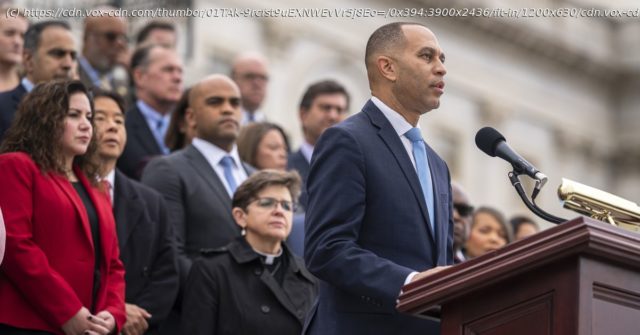A fractured GOP could be good news for Democrats.
Rep. Kevin McCarthy has become speaker of the House, but only did so by offering offered a series of concessions that effectively mean his speakership will consistently be under threat from his own caucus.
McCarthy’s agreement to weaken the role of the speaker is likely to lead to extreme gridlock within the ranks of the GOP. But it could also present an opening for Democrats. If far-right lawmakers in the GOP follow through on their promises to hold up pivotal spending and debt ceiling legislation, Republicans may well have to rely on Democrats’ help to get any bills across the finish line — a dynamic Democrats could capitalize on.
“The deal is, if they want to get stuff done, they’re going to have to work with us,” says Rep. Jim McGovern (D-MA), the top Democrat on the House Rules Committee. “And we’re not going to be a cheap date.”
Given Republicans’ narrow 222-person majority, they can’t really pass much if they lose any more than five votes in their own conference. Since conservatives have been vocal about their commitment to blocking key bills, like an increase to the debt ceiling, in order to get the spending cuts they want, Republicans will likely need Democratic votes to keep essential government functions and services running if they want to do so.
Additionally, given the number of Freedom Caucus members added to the House Rules Committee, Democrats could theoretically join with the conservatives on the panel to block or slow bills favored by House GOP Leadership.
The situation gives Democrats more leverage to put forth their own demands, if Republican leadership is actually interested in getting anything done. Of course, there’s a high chance that they aren’t, a reality Democrats are preparing to confront as well.
“I think there is an opportunity,” says Rep. Mark DeSaulnier (D-CA), a member of the Rules Committee. “But it’s just such an unusual time — and it’s so hard for so many of them to reach across the aisle.”The GOP may well need Democratic help on key bills
Republicans can only lose a handful of votes before any bill falls short of the simple majority it needs to advance, which gives Democrats an opening.
In the last decade or so, there have been times when House Republicans have relied on Democratic support when their conference has similarly fractured. In 2011 and 2014, Republican House Speaker John Boehner needed Democratic votes to approve spending bills to fund the government, for example.
That same dynamic could play out this term, with Republicans relying on Democratic help to make up for the support they’re missing in their own caucus.






